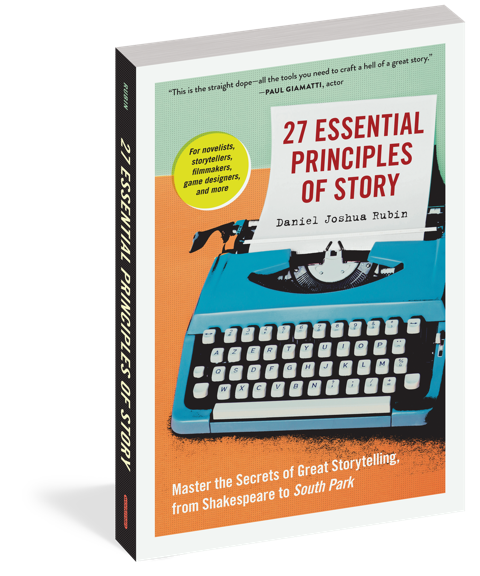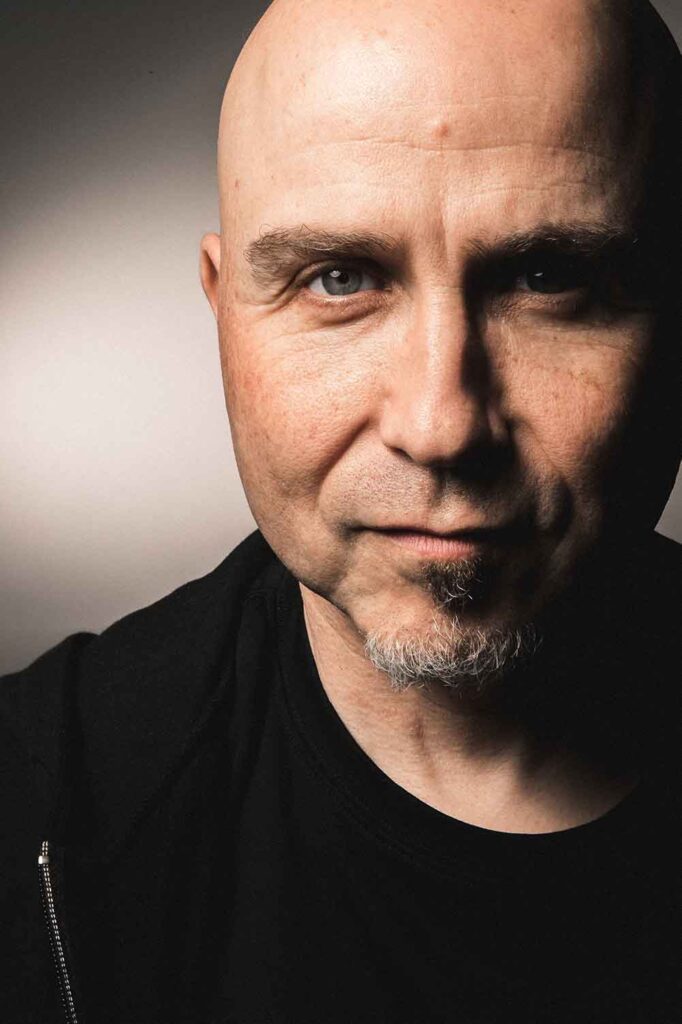
27 Essential Principles of Story
In 27 Essential Principles of Story, Master the secrets of great storytelling from Shakespeare to South Park you’ll find an elite methodology for mastering the most practically valuable principles of Story.
Here’s how it works.
First, the principle is stated in plain English. We’ve scrapped all terms like Inciting Incident, Crisis, Climax and even Plot Twist and replaced them with simple, concise – and self-explanatory titles. The problem with these terms is different people use them to mean different things. For example, technically speaking, the “Crisis” moment is what many teachers consider the final decision the hero makes to shape their fate. But this word is unsatisfying as stories are often filled with crises from start to finish. So, instead of calling the hero’s final decision the “Crisis” we’re calling it exactly what it is – the Critical Decision.
In learning story, the precision of language is important. When you learn a principle – and instantly get it – your mind quickly generates ideas to execute it. You gain confidence and build momentum. You get a jolt of electricity.
Next you get a Quick Summary that goes into a little more detail to flesh out the concept.
Then, in How It Works we’ll go through the mechanics of exactly how the principle works. The repetition here is deliberate to foster retention.
After this comes How a Master Did It. Here we’ll explore, in explicit detail, how elite storytellers executed the principle in their masterworks. This is not theory, or jargon or academic puffery. It’s objective fact. Greatness is never an accident. It’s the result of consistently intelligent, authentic and inspired choices.
Next we’ll lay out, step by step, How You Do It. This will teach you how to think more intelligently and with greater depth about the choices you make. If you set out to make a fortune, you’re dead. It doesn’t work that way. If you set out to use the art of story construction to have an intense conversation with yourself, to discover the truth of you are, something authentic and inspired can happen.
But we’re not done yet. In martial arts, what makes a black belt a true master is their willingness to drill the fundamentals. No black belt ever scoffs at drilling fundamentals. For example, a basic arm block is simple to learn. But a black belt still practices them countless times. To take the tension out. To breathe. To perfect their form. To infuse the movement with their own personality. It’s an incredible thing to watch two fighters execute the exact same move – in completely different ways.
So, next, you’re given a Mini Final Exam. Here you’ll get a very short story and be given a single question. Again, this will help you thinking more intelligently about the implications of executing – or failing to execute – the principle.
A Book About You
You’ll notice that at the heart of this methodology is the only person who matters – you. This is your book. At the dawn of social media, in an age of hyper-narcissism, in which everyone is talking (and often shouting) at once, it is easy to lose yourself. Every sentence is focused on helping you master the craft. And you’ll be inspired by the greatest writers of all time – not some egotistical fake-ass author pretending he reinvented the wheel. This is between you and the masters.
So, the last section of each chapter is Continuing Ed. Here you’ll find a story that flawlessly executes the principle. And you’ll be given a few simple things to consider. This way, you get the insight that comes from discovering how the principle works for yourself.
The Ultimate Method for Mastering Story
Now let’s look at the methodology. Here’s how each chapter is laid out:
- Title
- Quick Take
- How It Works
- How a Master Did It
- How You Do It
- Mini Final Exam
- Continuing Ed
- Mini Final Exam – Answer
You feel how hard that drills the principle? How once you invest a little time into doing the work, it will pay dividends for the rest of your career? This is not disposable information – the meaningless drivel we’re all drowning in. This is essential information that will help you realize your dream of writing your masterpiece. And you’re getting all this for the price of a book. There are underpants that cost more. Incredible.
While there are some fantastic dramatic writing programs – the truth is, sadly, that so much of what is taught gets forgotten. With 27 Essential Principles of Story, you will have the equivalent of an MFA in storytelling that stays by your side. If you run into trouble while writing it will be with plot construction, designing characters, creating a world, crafting dialogue or expressing an idea.
Yeah we do need another book on Story
If you’re like me, when you first heard that someone had written a book on Story, you thought, “Oh for shit’s sake, you gotta be kidding me. There’s a million books on story.” You’re right. But the problem is these books all suffer from one of the following flaws:
- They’re wise but lack practical value.
- They teach rigid formulas that strangle creativity.
- They’re packed with brilliant insight, but the layout is confusing.
- The stories referenced are almost all movies by white men.
Let’s address these one-by-one and explore how 27 Essential Principles of Story avoids these pitfalls:
The book offers nothing but practical value. Again, no theory, jargon or formula. It’s just timeless principles in plain English with adrenaline.
The 27 principles offer great flexibility. If you want a path to follow to help you write a page turner, you will find guideposts here. If you prefer to write something more interior and character driven, you’ll find critical information in chapters such as Earn transformations and Layer conflict.
The layout is intuitive and makes it as simple as possible to find exactly what you need, quickly.
The book contains the most diverse list of story references ever assembled. You’ll find stories by a wide variety of authors, genres, in all media, from various locations throughout time. And ALL the information you need is included. I give you an overview of each master work used as an example and detail the relevant portion.
The bottom line is this: trust your gut. All that matters with books on story is how they make you feel. They either give you a shot of inspiration or they don’t. With 27 Essential Principles of Story you will feel like getting after it, hard.
Get your copy now…
Daniel Joshua Rubin has written for television (NBC, the WB); new media (The Motley Fool, National Lampoon); and theater (with plays produced at Steppenwolf in Chicago, and off-Broadway in NYC). He has taught dramatic writing at Loyola University, Chicago, and at the University of California, San Diego. Throughout his career he has worked with some of some of the most talented and successful writers and artists, including Emmy Award-winners, Marta Kaufman (Executive Producer, Friends) Bill Prady (Executive Producer, Big Bang Theory), and Tony Award-winner, Anna D. Shapiro (Director, August: Osage County).
Rubin is a dedicated story scholar with a deep interest the role narrative plays in not only fiction, but business, investing, politics, relationships, personal development and the culture at large. Born and raised in Brooklyn, Rubin now lives in Evanston after a decade in Los Angeles. He holds an MFA in Playwriting from the Yale School of Drama, where he graduated with honors and a BS in Drama Studies from the State University of New York at Purchase. He is married to his wife of 27 years, Karen Frederick and has a daughter, Sally Marian.
